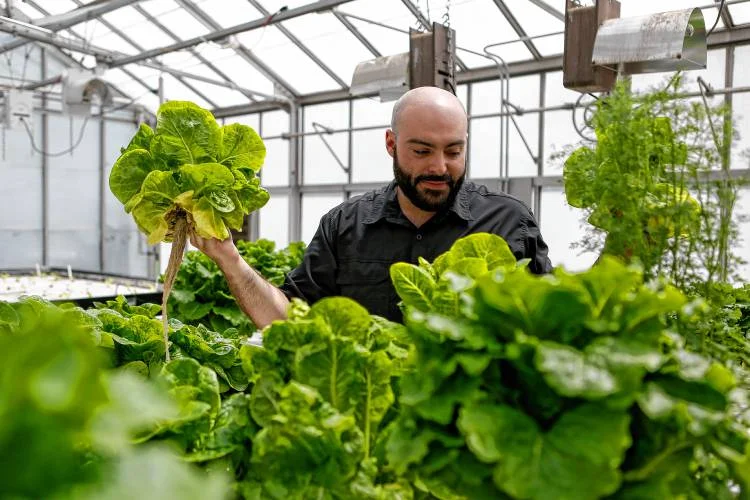Editorial: Research at UMass With Global Reach
Editorial: Research at UMass With Global Reach
Evan Chakrin, a University of Massachusetts Amherst junior studying horticulture, harvests butterhead bibb lettuce from a hydroponic raft bed Aug. 4 at the UMass Hydrofarm he co-founded with Dana Lucas, a senior majoring in sustainable food and farming. GAZETTE FILE PHOTO
August 17, 2017
Two students at the University of Massachusetts Amherst have turned a modest grant and an old greenhouse into the first hydroponic farm on campus to show off sustainable agriculture techniques.
An award-winning geoscientist at UMass will use a $94,375 grant from the Massachusetts Environmental Trust to gather and study water samples with the goal of better understanding the impact of droughts.
Those are examples of research that spills outside the university’s classrooms to address real-world issues such as local food production and climate change.
Evan Chakrin and Dana Lucas are co-leaders of the student-run hydrofarm in a small greenhouse next to Clark Hall in the central residential area of campus. Started last winter, the farm grows food without using soil. Nutrients are dissolved into the water surrounding the plants’ roots, and the system uses less water than an irrigated field. It also keeps nutrients from running off fields to other water sources.
“It’s basically just using chemistry to grow plants,” says Chakrin, a junior studying horticulture. “We can totally control whatever we waste.”
One Friday this month, he harvested 10 pounds of lettuce that he planned to donate to the Amherst Survival Center. Also during its first year, the hydrofarm has supplied food to on-campus restaurants, including the vegetarian Earthfoods Cafe. Other crops include kale, tomatoes and strawberries.
Lucas is a senior majoring in sustainable food and farming. Since it was elevated in 2013 from a concentration to a full-fledged major within the Stockbridge School of Agriculture, enrollment in the major has increased from 50 to 140 full-time students.
She started cultivating the idea for a hydroponic farm on campus in 2015, and with Chakrin received a $5,000 grant and use of the greenhouse from the Stockbridge School in December. They started germinating seeds and later in the winter began selling food they harvested. The revenue is used to buy more seeds and equipment.
In the fall, the pair will teach a course for 12 undergraduate students who want practical experience. “The techniques we use here are are the main hydroponic techniques used,” says Chakrin. “This work is directly applicable to any of their food production goals.”
He hopes to attract students interested in urban food production, even if they are not enrolled in the Stockbridge School. One of the benefits of hydroponics is that it can used almost anywhere to grow food locally.
Chakrin and Lucas also have a consulting service, which they call Farmable, to coach people who want to farm in urban areas. “Anywhere is farmable and this concept will revolutionize how urbanites are able to access food,” Lucas says.
Water is also an important ingredient in the research by hydrogeologist David Boutt, an associate professor in the Department of Geosciences. His grant — funded by the sale of the state’s environmentally themed license plates — will help develop an isotope mapping tool to study the composition of water samples and learn more about the effects of droughts. A public database will help water managers assess the sustainability of freshwater resources.
Boutt says, “By measuring the isotopic composition, we can start to describe the source of that moisture — did it come ultimately from the Arctic? Or the Gulf of Mexico?”
The data is important not just to better assess how droughts may affect an area, but also in relation to global warming. “As the Arctic is warming, more and more of that moisture is moving to New England,” Boutt says. “With this database we can start to track this and understand how the hydrological cycle is changing the source of moisture to the region.”
Boutt is seeking water samples from wells and streams in the region. Anyone interested may call him at 413-545-2724 or email dboutt@geo.umass.edu.
He will have an international forum to discuss his research next year after being named the Birdsall-Dreiss Distinguished Lecturer for 2018 by the hydrogeology division of the Geological Society of America. His topics will include groundwater and climate change, the role of groundwater flow in hydrologic processes and how water and lithium factor in the global transition from fossil fuels to green energy.
Chakrin, Lucas and Boutt put a face on the many people studying and teaching at the university who are determined to make a difference by applying what they learn locally to global problems.


